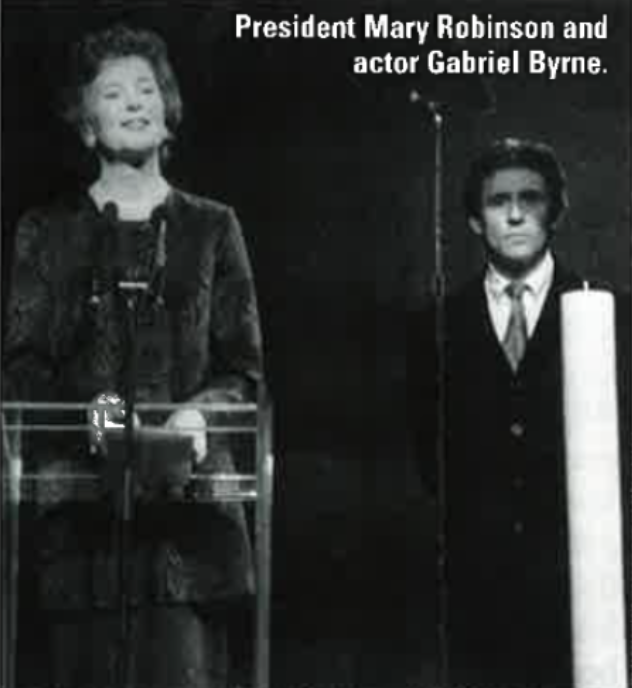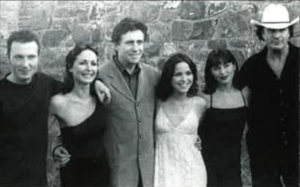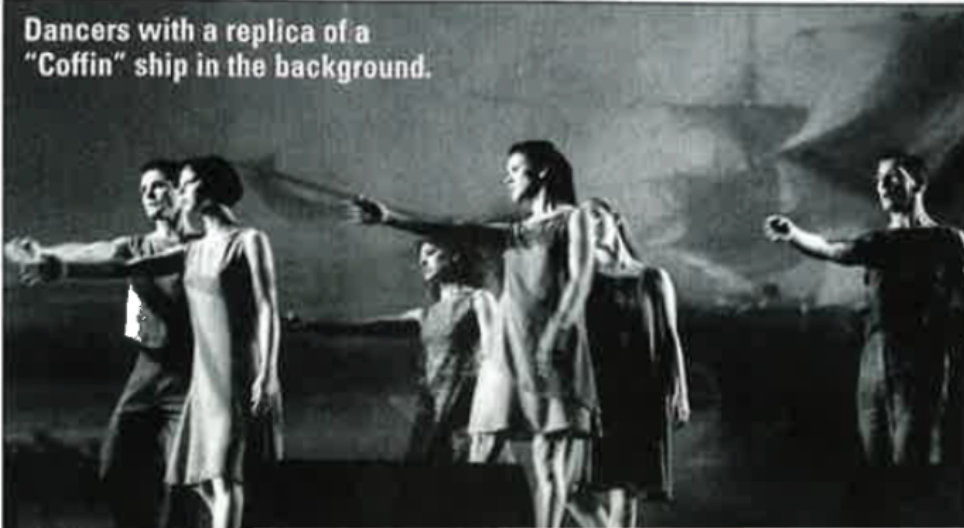Ireland commemorates the Famine. Colin Lacey reports.
Addressing a near-capacity crowd of almost 5,000 at the opening of The Great Famine Event in Millstreet, Co. Cork, Irish President Mary Robinson said that commemoration of the Famine was a moral act that should remember the victims but also use the lessons of 150 years ago to connect with issues that are relevant today.
“I think it is extremely important as we complete our solemn three-year commemoration of the Famine that we have in the foremost of our minds the connection that we are making with developing countries, and with hunger, poverty, marginalization and isolation,” the President said, before lighting a symbolic candle in memory of all those who died or emigrated between 1845 and 1850.
The candle-lighting ceremony was the central feature of the Gathering, a concert showcase by a diverse range of popular and traditional Irish artists and performers intended to celebrate Irish culture, heritage and tradition. Co-hosted by actor Gabriel Byrne and Riverdance star Jean Butler, the Gathering also featured a video-taped message from President Bill Clinton, in which he paid tribute to those who died during the Famine and praised the millions who emigrated and helped disperse the Irish spirit abroad.
“Perhaps the haunting memory of the Famine helps to explain the remarkable generosity of Irish people across the world,” he said, adding that the Famine was “the greatest disaster in the history of Ireland, but out of that tragedy emerged a blessing for our nation, the men, women and children who crossed the ocean to build new lives in America.

Presenter Gabriel Byrne read the text of a letter from Tony Blair in which the new British Prime Minister stopped short of formally apologizing for Britain’s role in the Famine, but remarked on the failure of the British government of the period to properly address the developing tragedy.
“The Famine was a defining event in the history of Britain and Ireland,” Mr. Blair’s leter said. “It has left deep scars…[it] is something that still causes pain as we reflect on it today. Those who governed in London at the time failed their peple through standing by while a crop failure turned into a massive human tragedy. We must not forget such a dreadful event. It is also right that we should pay tribute to the ways in which the Irish people have triumphed in the face of this catastrophe.”
But if the occasion for the commemoration was heartfelt and solem, the performances at the Gathering were lively and festive and had much of the audience straining to remain seated for the show’s two-hour duration. Against a large-scale, Turneresque backdrop of a Famine ship leaving an Irish harbor, internationally-known Irish artists, including the Corrs, Brian Kennedy, and Eleanor McEvoy, rubbed shoulders and swapped tunes with traditional superstars the Chieftains, the Daghda Dancers and the giant puppets of Macnas, and many other dancers and performers.
Some pieces performed were written specifically for the Great Famine Event. The evening opened in a contemporary vein with Maighread Meadh’s “Potato Rap,” after which Jean Butler introduced “Emigration,” a specially-composed piece by Paddy Moloney and Matt Molloy of the Chieftains which featured a recititation by Gabriel Byrne from actual letters and diaries of emigrants. Eleanor McEvoy played a moving song called “Famine,” and Jean Butler contributed a short prose piece called “Famine: A Sequence.” The Chieftains also received rapturous applause from the audience for their brief set, but the surprise hit of the night was actor Patrick Bergin, who performed two songs written by himself, including “I Want to See the World,” a piece he composed as he was leaving Ireland to live in the U.S.

The Saturday evening show, which was attended by U.S. Ambassador Jean Kennedy Smith and the British Ambassador Veronica Sutherland, was the culmination of the first day of the weekend-long Great Famine Event. Other commemorative events that day included a ceremony at Cobh, Co. Cork in which flowers were scattered from the deck of a replica Famine ship in memory of the thousands who died in passage to America. Representatives of Ireland’s clans then took part in a march to the old Cobh graveyard in which many Famine victims were buried in mass graves.
On Sunday, the Homecoming concert, featuring Van Morrison, Shane McGowan, Paul Brady, the Corrs, Brian Kennedy and many others, attracted over 15,000 more fans to Millstreet. Proceeds from the weekend’s events helped benefit The Big Issue Social Initiative, a charity dedicated to alleviate homelessness in Ireland, and Gorta, an Irish-based famine relief agency.
Gabriel Byrne, who had a special clause permitting him to attend the weekend’s proceedings written into his contract when he began a new Paris-based production of The Man in the Iron Mask, summed up what he considered the importance of the Great Famine Event when he told audiences at the Gathering that the Famine was “our Holocaust, and we never really faced and never really dealt with it. Now is the time to remember, to forgive and move on.”
Editor’s Note: This article was originally published in the July/August issue of Irish America. ⬥


Leave a Reply